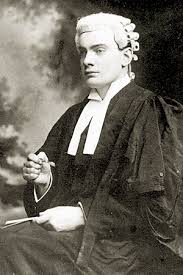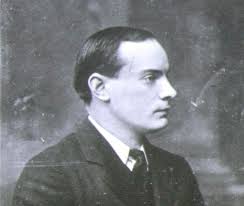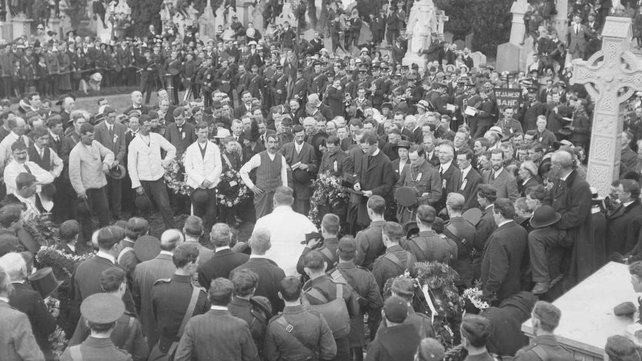
"startlingly original" -fROOTS
The critically acclaimed show, Visionaries and their Words, continues its successful Irish tour in March and April 2017 in Dundalk, Dublin, Cork and Belfast. See here for tour press release
With the release of the album Visionaries 1916 on September 30th RTE posted a tweet asking "is Visionaries 1916 The ultimate musical tribute to 1916" This review below is what RTÉ had on their website read it here or go straight to the RTE culture website.
A new album entitled Visionaries 1916 is the culmination of a remarkable traditional music project celebrating the leaders of the 1916 Easter Rising through a cycle of songs using the poetry of Pearse, Plunkett and Connolly, while paying due homage to the Pipers’ Club founder Éamonn Ceannt.
Renowned sean nós singer and composer Lorcán Mathúna is the driving force behind the project, teaming with long-term collaborators Martin Tourish and Daire Bracken for the recording. “The reason The Rising inspired so many Irish people, and indeed people throughout the world," says Lorcán, "was that it was led by people with vision who could express their ideas so clearly and profoundly. They included artists, politicians, poets, authors, teachers, and visionaries. In this album I have used their words, and only their words, to explore their ideas and vision and do honour to their memory.”
The album was made possible after the concept of a songcycle using the poetry of the Leaders of The Rising was selected for inclusion in the Arts Council’s program for the national commemorations of its centenary, ARTS : 2016. Last August, it was one of only 9 projects from across all art disciplines selected for inclusion, and six months of research and composition later, 1916 – Visionaries and their Words was ready for its world premiere.
With music by Lorcán and Íde Mac Mathúna, Daire Bracken, Martin Tourish and Éamonn Galldubh, the project has since been performed to critical acclaim at home and at the Festival Interceltique de Lorient in Britanny. Seeing the live show, one reviewer said: “Bringing the words of those who fought for Ireland’s independence, to life once again, this truly was an emotive piece of performance art."
In a year awash with albums commemorating The Rising, what makes Visionaries 1916 unique is its focus on the words and writings of the signatories of the Irish Proclamation. Every song on this album, which sets seven poems by Plunkett, Pearse, and Connolly to music, was written by signatories of The Proclamation. – the only exception being an epitaph by the WWI poet Francis Ledwidge.
According to Lorcán, the album was not meant to be a contemporary revision of The Rising, but a musical inspiration taken from the words and vision of its leaders recorded in their own time, in their own words, from their own pens: “So it’s not all songs of freedom and rebellion, although that theme does feature of course, but it also deals with the great passions of these men; the sort of things that any ordinary person might write about -unreturned love, language and music, hope and disappointment.”
“We saw this whole effort as not really being about us making music," he says, "but about letting our music be moulded by the art of other people. So we have diverted in style to unexpected places. We wanted to be true to the idea that we were responding to the integrity of the ideas in the lyrics, and the proclamation's signatories were passionate about many diverse things. Patrick Pearse’s poetry has a beauty which sees to the heart of rural Ireland, and of nature itself. Joseph Plunkett wrote profoundly of the spirit, employing veils of meaning whilst paradoxically expressing incredibly clarity of image. James Connolly wrote ballads of the downtrodden and the rights of the poor and Éamonn Ceannt expressed himself with the music of the hearth of old Ireland. This album uses their own words to present a holistic picture of the leaders of The Rising; not just the revolutionaries, but the visionary reformers, philosophers, humanitarians, poets, and artists.”
From the performance at Brittany's premier music festival; the Festival Interceltique de Lorient, we have this fantastic review. Read the origional in French here read the translation below
Although dedicated this year to Australia, the Inter-Celtic Festival held an evening commemorating the Irish Easter Rising in 1916 on August 11, at the Grand Théâtre de Lorient.
As the director of FIL, Lisardo Lombardía, indicated “it was inconceivable that Interceltic misses this major event in the contemporary history of the Celtic countries.”
In a sort of introduction to the evening, the Cultural Institute of Brittany offered in the afternoon a conference on Easter 1916 by Alain Monnier. In front of nearly 120 audience, this specialist on Ireland provided insight into the origins and reasons for the uprising. The ICB has also made a booklet which will be discussed later.
The evening "1916, visionaries and their words" deliberately planned and chosen by the FIL to highlight the centennial of 1916 was still a daring bet by the organizers and Ireland 2016, as the event of the summer regarding the 1916-2016 programming in Brittany. This bet was won because nearly 700 spectators finally attended this memorable evening.
Alternating reading of texts written by the main actors of the uprising by the excellent actress Elaine Ó Dea, perfect interpretation by Lorcán Mac Mathúna and Íde Nic Mhathúna of songs and music composed by these personalities, amid archive images of Ireland from the years 1910-1916, this show conquered those present. The high quality musical accompaniment was by Martin Tourish accordion, violin Daire Bracken, Eamonn Galdubh the uilleann pipes.
The extremely absorbing chosen texts, illustrated the thoughts, passions, doubts the motives of 1916. The hero of one of these texts was highly applauded by the audience because it resonated undoubtedly strongly with the situation in Brittany: a declaration by Patrick Pearse denouncing the state of education in Ireland which denied any place for Irish language and culture ...
Remarkable, there is no other word to describe this exceptional evening that the audience had a hard time leaving, with continued applause until all of Lorcan Mac Mthuna [‘s band] left the stage to the hall of the Grand Theatre where he was truly besieged by all who would purchase the CD of the show.
A great success that touched the heart participants.
Thank you to Lisardo Lombardía and Interceltic for allowing the arrival in Brittany of such a performance.
PS: one may wonder why there are few shows of this style produced in Brittany....
“naked I saw you,
o beauty of beauties”
These are the opening lines of Padraig Pearse’s transformative poem “Fornocht do Chonac thú.” Pearse had taken a trope of modern Irish poetry and transformed it into a powerfully symbolic gesture of self-sacrifice and heroism. 
In doing so, he not only provided an answer to a burning question in the revivalist Gaelic literature movement -whether the nascent modern Irish literature should reference ancient Gaelic literature or should be derived from the folk vernacular- but he inverted the Aisling and tied the imagery of nationalism to the sacred ideal of self-sacrifice.
During the era of the penal code in Ireland the political Aisling became an ubiquitous statement of Gaelic nationalist aspiration. In the Aisling, the poet is visited by a vision; a supernatural embodiment of the sacred ties of homeland, and incited to take on his duty and expel the foreign oppressor. The Aisling promises that the reward of duty will be liberty.
There are so many examples of these poems, preaching the same message; revolt and you will be liberated.
Pearse describes a different type of vision. In fact his poem centres around knowing that the price of duty is death. It is a toll that he struggles with and turns from; before finally accepting his duty and his destiny.
 In Pearse’s Aisling, duty is a burden which will extoll the highest price. He joins the nationalistic fervour of this most politicised poem to the religious symbolism of Christ’s passion. Like Christ, he knows that his duty will lead to death and he fears accepting it. Like Christ, he agonises over whether he should chose duty or life, and like Christ he accepts duty and its consequent price.
In Pearse’s Aisling, duty is a burden which will extoll the highest price. He joins the nationalistic fervour of this most politicised poem to the religious symbolism of Christ’s passion. Like Christ, he knows that his duty will lead to death and he fears accepting it. Like Christ, he agonises over whether he should chose duty or life, and like Christ he accepts duty and its consequent price.
Pearse’s symbolism is so powerful, and is heightened by a syntactical ambiguity which he opens with, but doesn’t quite answer. “Naked I saw you”
Who is naked? Is it the poet, bereft of uncertainty; of chance; vulnerable and helpless before the enormity of his destiny? Or is it the Vision which is naked, revealing all with dreadful clarity?
In the Aisling tradition, Duty rewards with liberty. In Pearse’s Aisling, Duty promises death. But it also promises a thing which Pearse preached increasingly, a noble sacrifice that can transform a nation.
The Irish language cultural movement at the close of the 19th Century -which Pádraig Pearse was a major part of- had an identity conundrum. Should it take only from the vernacular speech of the rural native Gaelic speaking world, or should it look to the broken chain of Gaelic literature for inspiration. In this and other works Pearse answered that it needed to straddle both
 O Donovan Rossa
O Donovan RossaPatrick Pearse’s oration at the graveside of the exiled Fenian, Geremiah O Donnovan Rossa, on August 1st 2015, was one of the major catalysts in igniting a revolutionary sentiment on the road to the Easter Rising.
Pearse’s firebrand speech about the “unrepentant Fenian” went down in history for its power and near perfect weight of delivery.
A native of West Cork, O Donovan Rossa, had been instrumental in the formation of Fenianism in Ireland and America. He was born before the famine wreaked devastation on the Irish population and he gives a personal account of this time which he says remained with him his whole life.
In his 1898 recollections, Geremiah O’Donovan Rossa tells of the blight that came on just before the harvest of 1845.
“One fine morning in July” he recalled, “there was a cry that some blight had struck the potato stalks”.
The leaves had turned black and when touched crumbled to dust. The crops withered day by day and a sickly stench rose out of the potato fields. The potatoes, which had grown fairly large were dug and put into pits, but the seed of decay had been planted in them too and before long a cry arose throughout the country that they were rotting in the pits too.
He helped his father to open their pit, and sure enough the potatoes were half rotten. They set to the labour of opening all the pits and separating the potatoes not touched by rot and carted them into the ‘chamber’ house back of their dwelling. The chamber house had been specially prepared for the potato harvest; with walls padded with straw, but the stench of decay soon found its way in there too. Then all hands were set to separate the untouched from the blackening heap and those that were whole and appeared sound were taken into the loft over the kitchen.
Bu the stench of death entered the loft too and before many weeks the entire crop, that was to feed the family for the year, had been eaten by the blight.
 However his father had another crop. Their wheat crop had ripened splendidly in the field, and when it was reaped and stacked the landlord put “keepers” on it, who stayed in the house until it was threshed and bagged and sent to the mill. £18 the wheat fetched and the landlord kept it all for rent.
However his father had another crop. Their wheat crop had ripened splendidly in the field, and when it was reaped and stacked the landlord put “keepers” on it, who stayed in the house until it was threshed and bagged and sent to the mill. £18 the wheat fetched and the landlord kept it all for rent.
So that is what the corrupt English administration of Ireland did while the Irish starved; they sent armed men to guard the food so that the poor would starve and the markets had its supply of Irish wheat, meat, and dairy.
From the same period, Tomás Siúnach, a farmer of Carna Connemara writes a vituperative satire I praise of the famine relief officer of Carna, Johnny Seoighe (Joyce). In the song, Johnny Seoighe, he decries Joyce’s corruption and inactivity while his own family suffer starvation and death.
It is a powerful and griping statement expressed in vehement and unblinking anger. An exceptional piece of writing from a time where silence descended on the bothán’s and fields of Ireland; it is a testament and reminder of human frailty and perseverance.
I recorded Johnny Seoighe on my first album, Rógaire Dubh, in 2007. Listen to it here.
100 years on from a remarkable revolution of visionaries and poets, 1916 - Visionaries and Their Words explores the writings and ideals of the leaders of the Easter Rising, in a concert programme inspired by their lives, their work, and their words.
With new music drawn from writings of the rising's leaders, as well as existing songs in the tradition from their pens, sean-nós composer, Lorcán Mac Mathúna will attempt to interpret the vision of these revolutionaries and to explore their legacy and ideals.
Inspired by the words and spirit of the proclamation, 1916 – Visionaries and Their Words, presents an audiovisual experience of music, song, and archive imagery and an artistic response to the words and vision of The Risings leaders. This concert will feature male, female, and children's voices to celebrate the part played by the people of Ireland in this most momentous event in Irish history in the 20th Century.
20/01/17 Wexford Arts Centre
31/03/17, 8pm An Táin Arts Centre, Dundalk
02/04/17 5pm Seán O Casey Theatre, East Wall, Dublin
29/04/17 8pm Culturlann, Belfast
24/07/17 Folk Holidays Czech Rep
30/07/17 Skibereen Arts Festival
30/01/16 Dublin TBtradfest
31/01/16 Dublin TBtradfest
02/02/16 Derry DITMF
11/08/16 Lorient France
Festival Interceltique
16/08/16 Ennis
Fleadh Cheoil na hÉireann
30/09/16 Monoghan
Iontas Arts Centre
Album release gig in
Músaem an bPiarsach
St. Enda's Rathfarnham
15/10/16 ; 3:30pm
ART: 2016 is the Arts Council's programme as part of Ireland 2016. It is a diverse and distinctive public showcase of Irish art which will be presented across Ireland and abroad throughout the year. Key programme strands include the Open Call National Project Awards, which feature cutting-edge, contemporary art events in dance, visual arts, poetry and music; the Next Generation Bursary Awards which highlight the work of eighteen rising stars of Irish art; and A Nation's Voice, an open-air, free concert at Collins Barrack on Easter Sunday, featuring new choral and orchestral work by Shaun Davey and Paul Muldoon, and the voices of a 1,100-strong choir. The programme also includes a selection of national touring productions.
ART: 2016 is supported by the Department of Arts, Heritage and the Gaeltacht through its Ireland 2016 Centenary Programme and is created with a range of partners; local, national and international